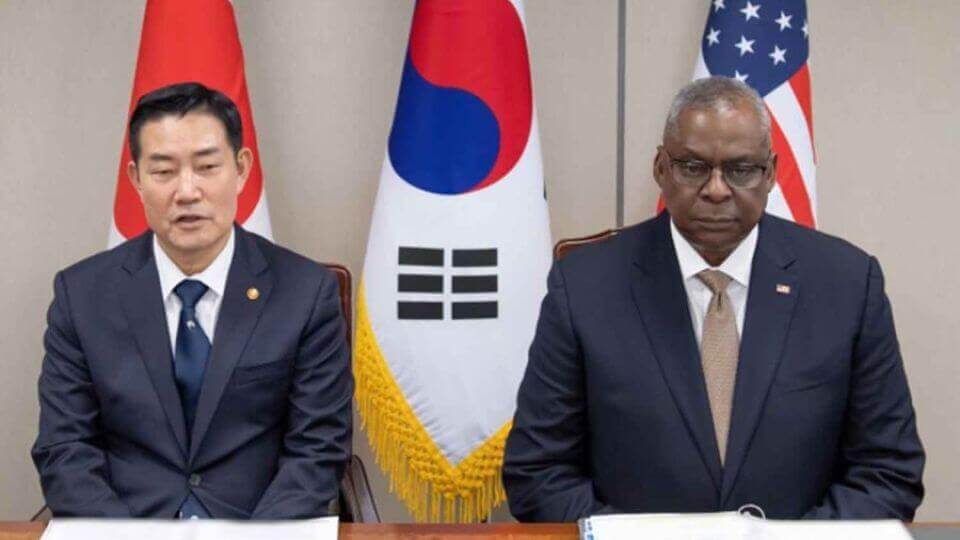Defence leaders of the US, Japan, and South Korea condemned North Korea’s increasing nuclear and missile threats and Russia’s ‘unprovoked aggression’ in Ukraine, and called for peace and stability in the Taiwan Strait in a trilateral meeting this past weekend.
On Sunday, US Defence Secretary Lloyd Austin met with his South Korean counterpart, Shin Won-sik, in Seoul, with Japanese Defence Minister (DM) Minoru Kihara participating virtually.
I met today with Minister Kihara and Minister Shin to discuss how the U.S., Japan, and the ROK are continuing to advance our military and defense cooperation under the leadership of President Biden, Prime Minister Kishida, and President Yoon. https://t.co/lwvld1mSxO pic.twitter.com/KBczCicjZV
— Secretary of Defense Lloyd J. Austin III (@SecDef) November 12, 2023
Leaders Discuss International Order, Ukraine War
The joint statement released after the meeting mentioned that the three leaders reviewed regional security concerns and discussed measures to improve trilateral security cooperation to handle security challenges in the Indo-Pacific.
The defence chiefs emphasised the need for a rules-based international order and reaffirmed their strong opposition to unilateral actions that aim to change the status quo by force or coercion.
Additionally, they reiterated their commitment to stand with Ukraine against Russia’s “unprovoked and brutal war of aggression.”
As per the statement, the leaders acknowledged that Russia’s actions constitute a severe violation of sovereignty that “undermines the fabric of the international order.”
Importance of Peace in Taiwan Strait
The three nations’ defence leaders also stressed the importance of peace and stability across the Taiwan Strait to global security and prosperity.
They raised concerns about operations that violate international laws, such as the UN Convention on the Law of the Sea, and criticised recent risky acts against boats, ships, and planes operating in and over the East and South China Seas.
Additionally, they evaluated the implementation status of the trilateral security cooperation measures outlined at the Camp David Summit and concluded that the trilateral cooperation between their countries is stronger than ever.
US, Japan, South Korea to Share North Korea Missile Data https://t.co/T2TT6KNa1i
— Voice of America (@VOANews) November 13, 2023
Framework to Share North Korean Missile Data
The defence officials agreed on a framework to simplify real-time missile warning data exchange and enhance each country’s capabilities to monitor North Korea’s missile launches. They affirmed that the data-sharing mechanism is in the final stages of testing and agreed to make it fully operational by the end of December, the statement said.
Japanese DM Kihara told reporters that the ministers discussed increasing their three-way cooperation in the face of “severe security environments.” He stated that it was the first time the three ministers held such a meeting.
“We confirmed that we are steadily making adjustments, bringing the process to the final stage,” Kihara said.
Trilateral Exercise Plan
The defence leaders also advocated for the expedited development of a multi-year trilateral exercise plan, which is currently being formulated to conduct trilateral exercises more systematically and effectively, and is expected to be finalised by the end of 2023.
They further hailed the success of a trilateral aerial exercise undertaken by the three countries in October 2023, and underlined the necessity of continuing similar exercises to demonstrate the countries’ strong will and capacity to respond to challenges in the Indo-Pacific.
In his concluding remarks, Secretary Austin reiterated the US’ steadfast alliance and “extended deterrence commitments to Japan and [South Korea] backed by the full range of US capabilities, including nuclear capabilities.”
Meanwhile, DMs Kihara and Shin emphasised the significance of bilateral ties and trilateral partnerships in protecting and advancing their shared security goals.
The leaders agreed to continue working closely to maintain peace and stability in the Indo-Pacific region and worldwide.

